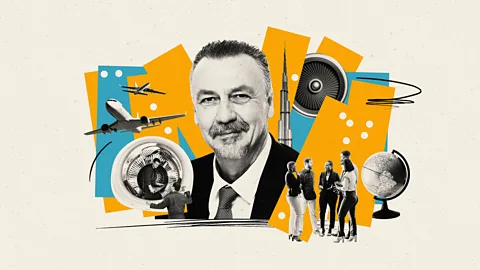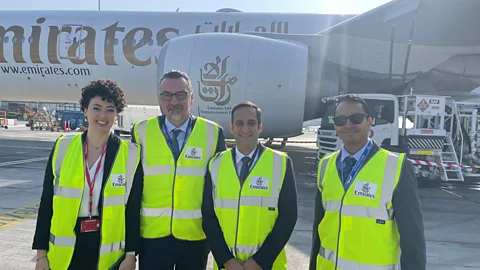How GE Aerospace's cross-cultural team cracks the biggest problems

Aziz Koleilat, GE Aerospace's vice president of sales and marketing and general manager, enters the BBC's Executive Lounge to talk about how international perspectives drive innovation.
Business no longer happens in a vacuum. In a globalised environment that's only becoming more interconnected, leaders need to have a cross-cultural perspective to take the right decisions. Aziz Koleilat knows that.
Born in Prague and raised in Lebanon, Koleilat went to university to study biomedical engineering in the US, then earned his MBA in Canada. Now at GE Aerospace, he serves as the vice president of sales and marketing and general manager for the Middle East, Turkey, Eastern Europe and Russia/CIS – and is tasked to draw on his global experience to build teams committed to expanding GE's footprint in this critically important region.
"Creating diversity of thought and experience in a team is critical," Koleilat tells the BBC. "Diverse teams must allow for the free exchange of ideas. All the deals that GE has made here in the Middle East come from a collaborative environment." The work he's done has made its mark: three out of every four commercial flights globally are powered by a GE Aerospace or GE partner engine on airlines including Emirates, Qatar Airways and Turkish Airlines.
Now, Koleilat is taking on an even more urgent challenge: tackling sustainability in aeronautics with the use of alternative fuels. Although the problem may be different, however, his strategy remains the same: creating an inclusive, innovative working environment that encourages big and small ideas alike – and shapes future voices of global business. "It's fascinating to watch how people grow. I like to help them grow and thrive and then I move on, and I open the space for them to become leaders, he says. "It's a simple formula for success."
Koletiat talks to the BBC about the critical role of diverse cultural perspectives, and the pleasure of seeing your team grow.
Executive Lounge
The BBC's series features interviews with executive leaders making innovative, data-driven decisions helping shape the future of business – and paving the path for other leaders to thrive. Read more conversations here.
At GE, you've worked across so much of the business. What have you learned along the way as you've collected cross-sector experience?
When I got to GE, I started out in healthcare, then power and eventually to aerospace.
Having had the opportunity to work within multiple businesses, and move to new countries, I am sensitive to the dynamics of new teams, new regions and new cultural dynamics. We have a tendency as business leaders to come into a new situation and immediately focus on the product: create the product, then go to market. Having made significant moves across sectors and regions, I think that can be short-sighted. I believe it's important to take the time to learn the unique elements of each unique market. If you are able to develop a deep understanding of your market, you will have greater insight into the product and how you can make it fit the needs of the consumer.
On a personal level, I think that movement is important for career growth. In every sector I've been involved in, I've learned it's important to understand when you've reached a level where it's OK for somebody else to come and take over. At some point, everybody will reach a plateau where you are not learning anything new or different. That's when somebody new must take the team to another level. I'm proud that many of the healthcare people that used to work with me and reported to me took over my job when I moved on. For me, movement is very much about getting to the next challenge and giving others the chance to grow.
 Courtesy of GE
Courtesy of GEYou've overseen some big changes in the aviation industry, including the widespread use of sustainable aviation fuels. What do the solutions of the future look like, and how are you getting there?
We're working on so much: electric, hydrogen, open fan and lots of different technologies. You're never working on just one thing – you have to do multiple things at the same time. You have to create efficiency, you have to streamline and perfect technology. Right now, we are very invested in alternative fuels, but we are also looking to other solutions for the future – something the team here is fully engaged with.
One of the challenges in this region specifically is something called the "hot and harsh" environment: there's lots of sand here. And very simply, what happens is, as the sand gets into the engine, it sticks to the fans, and reduces the efficiency of the aircraft. Hence, your fuel usage goes up. In most places, they are washed with water, but here, the minerals get stuck to sand. So, we developed a rinse that will actually get the engines in this region clean. And that seemingly small thing will be a huge improvement for the environment.
More from Executive Lounge:
For this kind of small-but-important innovation, we have to have a team that's committed, and has the space to drive the direction of technology and the resources to do it. That's the critical part that I go back to every time I talk about diversity: we have to encourage experimentation and open dialogue from everyone on the team to innovate.
The legacy GE has recently transformed into three industry specialised, independent companies. What can niche businesses do that larger conglomerates can't?
The most important point is to really to focus on our specialties, and we've fully focused on aerospace. Within that sector we are focusing on the future of developing technologies. So, this is quite an undertaking.
For example, investing sustainability in healthcare is different from investing in technology for aerospace. The key point is for each sector to have the space to create their own technology. I think at this point because of the legacy that GE has in the aerospace industry and the technology we have, there is a bright future going forward. It's necessary to be really focused on that future.
Second, we have a real opportunity as a leaner organisation to try new things, take on new challenges. And it doesn't have to be moving vertically to be moving bigger. What ever gets you curious is something you should take on and try because that will build new experience. For me, it's still about the team. My biggest pleasure is seeing the teams that I've worked with grow and really develop further.
GE Aerospace by the numbers
You've mentioned the importance of collaboration quite a few times. What do you think is most important about teamwork?
Most importantly, we need to make sure that we have diverse voices on our teams. If you understand the market, you understand the product, the last step is creating a diverse team and giving them the space to share ideas and solve problems together by utilising their own diverse backgrounds and expertise and valuing those things in their team members. Companies are learning the value of diversity in all aspects of their business.
And then, very importantly, all teams need a space where they aren't afraid to tackle difficult things that might not work out. There should be a safe space for all your employees to be able to tell you if things aren't going in the right direction. We need to have transparency of information – especially in a highly volatile environment, there are lots of stakeholders and differences of opinion. I really believe in fuelling the mindset of solving problems together as an organisation, of being committed to that purpose.
And so I look at it from all different angles: putting a team together, and then giving them the self-confidence to voice their opinion and grow their careers. In my career, I've been very lucky to work with very, very smart people that have gone on to pursue something bigger than me, and I want to continue that momentum.
This interview has been condensed and edited for clarity
--
For the best of BBC.com in your inbox every Friday, sign up to The Essential List newsletter for a handpicked selection of features, videos and can't-miss news.
